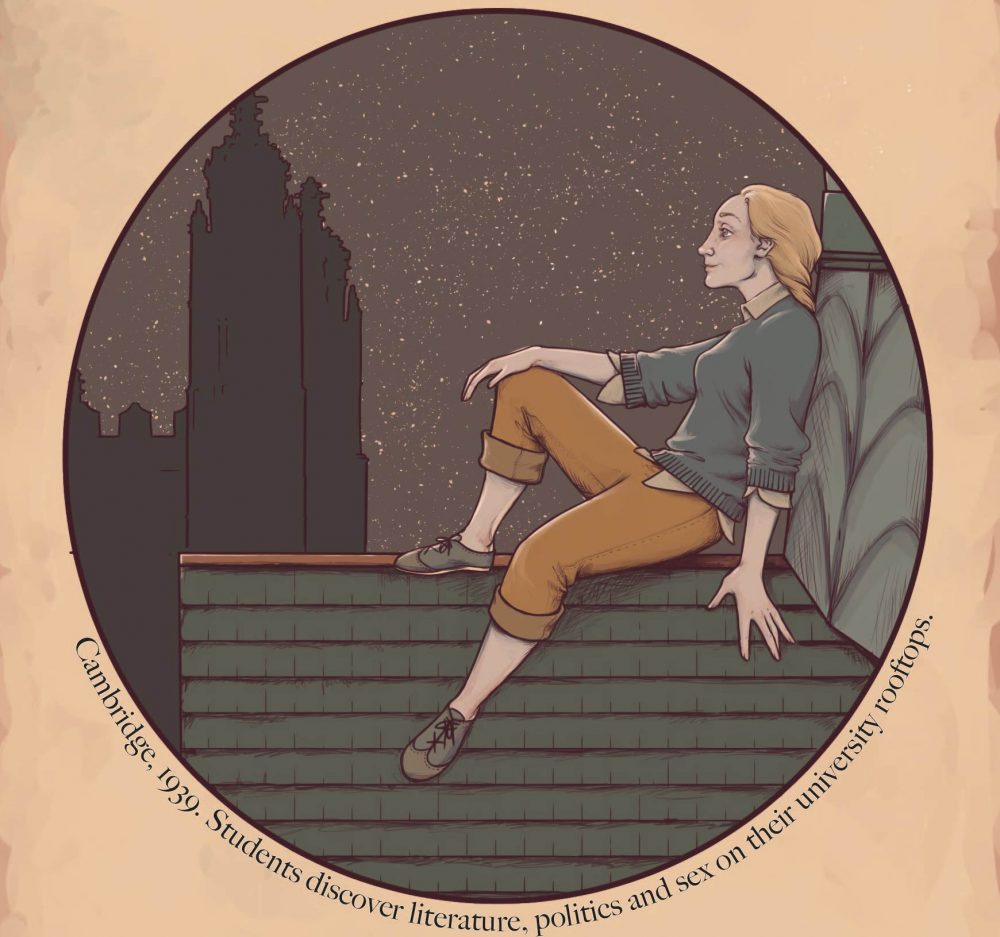
Lights up on a black box theatre. In 1939, Rosalind (Monique Marani) scoffs biscuits, reading one of her father’s sexist thriller novels. Her temporary roommate, Lucy (Alana Dare) brushes her hair and dreams of becoming a “beloved wife and mother”. The peace is interrupted by three ‘night-climbers’, boys who make a game of risking their lives on the rooftops of Cambridge University.
Elly D’Arcy has written a wonderful show. Every witty remark has been carefully chosen, and rarely do they miss the target. D’Arcy, who is also co-director with Nat Speechley, has worked hard on pace and rhythm, and the first act flies by at a clip. We witness Rosalind becoming a night-climber, introducing Lucy to the lecherous George (Harry Dowling) and falling for the charming, if shy, Frederick (Gregor Campbell).
It is a shame that the sound levels weren’t quite right, as what may have been highly entertaining scenes are let down. The Cambridge Women’s Communist Brigade is one such example. Comic timing comes to a halt when most of the actors are unable to project over the blaring notes of Communist anthem The Internationale. The Brigade, headed by Ruth (Shannon Brown) are a welcome change from the dimly lit rooftop scenes, providing levity and comic relief. The Brigade have an excellent sense of camaraderie that is delightful to watch, and even the tension between Ruth and Tommy (Emma Batty) had the audience laughing.
In Act 2, what began as glib remarks about the patriarchy quickly become dangerous misogyny. George (Harry Dowling), sexually assaults Lucy. At the exact same time, Fred and Rosalind are ‘having an encounter’ of the consensual kind. A more direct contrast could have been made here – with both scenes running concurrently, the audience would likely have found themselves in a bittersweet deadlock of emotions. As it was, we were offered hints of this, but the decision to fade lights up and down between the two scenes didn’t do justice to D’Arcy’s writing. As Lucy reluctantly confides in Rosalind, Speechley and D’Arcy made the decision to have Lucy (Dare) face away from the audience. This choice would make some sense in the immediate context of a sexual assault. Survivors often feel ashamed and close themselves off from the people closest to them. However, Dare has such an expressive face: it was a loss to all involved that the audience was unable to read her emotions on it.
Later, Rosalind confronts Fred with the knowledge of George’s vile act, and he does not believe her. Poignantly, Rosalind has the final word, holding Fred accountable for his casual misogyny, but not before being expelled from Cambridge for publishing slander about George. A beautiful ending is marred by an intrusive war drum sounding as Alex hands Fred his WWII uniform – just in case you forgot it was the 1939.
Overall, the team at MUST have once again delivered an excellent new work, proving that students are capable of more than they are given credit for. Speechley and D’Arcy should be commended on their excellent direction, but D’Arcy should also be raucously applauded for an intelligent, charming and poignant script.
